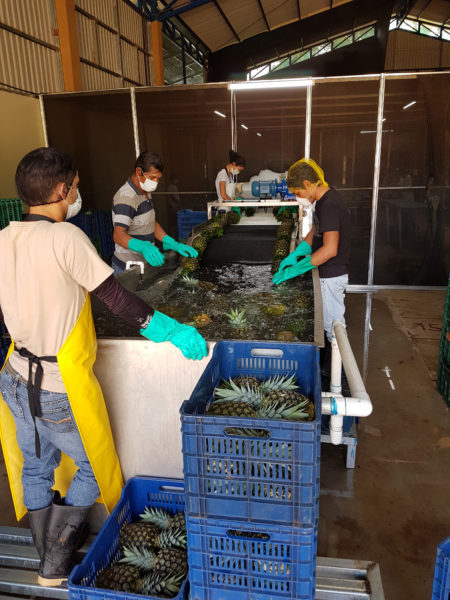Country: Costa Rica
Sector: Organic pineapple
Investment: Expansion of the production zone with at least 18 hectares from the current 20 ha
Total estimated capital expenditure: USD 630.000 for the expansion of the acreage
Investment type: 6-year subordinated loan, 2-year grace
Amount invested by Kampani: USD 580.000
Co-investor: Not applicable
In portfolio since: July 2018
Deal sourced by: Alterfin and Rikolto (formerly known as Vredeseilanden, VECO)
The business
Founded in 1984, COOPEASSA is relatively long-standing for a cooperative. The current leadership is its “second generation.” COOPEASSA operates in the south of the country. It has a 4M USD turnover in coffee alone, which historically was its only activity.
COOPEASSA’s members felt the need to expand to a crop that generates an income year round. The income from coffee is just once a year. It has therefore entered into the production of a variety of exotic fruits like pineapple and banana. The climatic and soil conditions are excellent for these crops and they have a good access to the US market.
COOPEASSA has an ambitious investment programme, the management capacity to carry it through, an expanding and stable membership base, a proven track record, and a demand for its product that exceeds their production.
But it also has a weak balance sheet. Just like most cooperatives, the profits are upstreamed to the members and it therefore remains stubbornly undercapitalised.
The investment
The connection between Kampani and COOPEASSA, a cooperative in Costa Rica, was established by Rikolto (formerly known as Vredeseilanden/VECO) during the Building Trust Seminar at the end of 2016. In July 2018, Kampani completed the transaction.
By providing subordinated debt, Kampani’s investment allowed for an accelerated expansion of the acreage devoted to the production of organic pineapple. A total of 14.5 hectares has now been converted to pineapple production, although this still falls short of the projected total of 18 hectares.
Kampani made sure that the further expansion of the acreage devoted to pineapple is self-financed. COOPEASSA has committed to capitalizing 5% of its total sales (all crops). The 2020 sales (all crops combined) are projected to reach 17.3 million USD, representing a capitalization of around 865,000 USD for that year.

The social impact
Clearly, Costa Rica as a country is relatively rich compared to for example nearby Guatemala and Honduras. Nonetheless, the smallholder farmers in Costa Rica are confronted with the same constraints as anywhere else (as exemplified by the lack of long term investment capital). The cooperative plays a crucial role in empowering the farmers concerned, providing opportunities for a diversified income, access to niche and high margin markets, certification, training, access to credit, and technical assistance.
COOPEASSA has in this regard a rich and long history. By expanding into organic fruit production and processing, it aims to continue contributing sustainably to the well-being of its members and the general economic development of the area. It is also recognised by the government as an important catalyst for growth in this part of Costa Rica, far from the areas benefiting from the tourist industry.
The figures so far have confirmed that the expansion to pineapple production was appropriate. The per hectare income for the farmer differs greatly per crop type, varying from some 3,200 USD per hectare for conventional coffee and 4,500 USD for organic coffee to almost 20,000 USD per hectare for organic pineapple. Yet, the high upfront investment costs continue to deter some producers from branching out.
2019 saw improved profitability through smart growth strategies, a new interim general manager, and scaling up of production of organic fertilizer and other inputs thanks to a new installation and lab.
